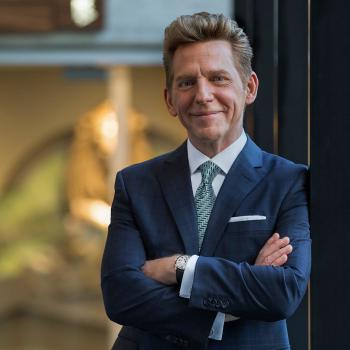The LA Times asks a Scientologist how she responds to critics of Scientology.
What do you say to ex-members who refer to Scientology as a cult?
Apostates have to denigrate that which they formerly held dear. It’s a human psychological necessity.
Critics say some people join Scientology and become completely absorbed in it.
Adherents to a cohesive “theory of life” that helps them to define not only who they are, but who their friends and not-friends are, and how life works, and the reasons for everything, may get eyeball-deep in it because it is working for them. They may join the most hard-core adherents in a total dedication to the cause.
Some religions have monks and such who dedicate themselves to all-religion-all-the-time. Scientology has a small order of deeply dedicated staffers, adults only, which does not admit all comers. It’s called the “Sea Org,” (short for sea organization) because it began at sea as Ron’s crew on a boat manned by his closest supporters. The vast majority of Scientologists are grocers, mechanics, secretaries, baristas, cabbies and the like.
What are two or three things you would like people to know about Scientology?
1) Scientology is not “weird.” It is logically and internally consistent, and answers a lot of questions and solves a lot of problems. It’s not a plot, conspiracy or cabal, we don’t want any members who don’t want to be members, we don’t want to brainwash you or your kids, and we are not trying to take over the world. We would like less war, less insanity, less criminality; people who are free, kind to their fellow man, and not suffering from the psychic wounds that make some seem evil or without hope. We want people to be able to rise through their own accomplishments, and without harming others along the way.
2) Scientologists are not “weird.” We’re ordinary folks who do ordinary things — with a little more insight, success, and a little less upset than before we had Scientology, we like to think.
3) It’s not about power, and it’s not about money. No one in Scientology profits from it. We do insist that if anyone wants our help, that they earn it with work, or with some material contribution that we can use to keep the lights on, pay the rent, keep a roof over the staff’s heads, pay our “supervisors” (think teachers), counselors, clergy, etc., maintain our cars and vans, mow the lawns, provide private spaces for counseling and quiet, orderly rooms and texts, etc. for training, chapels for services and ceremonies, get the word out, etc. We don’t pass a contribution plate at services. We only ask those who are actually getting something to give anything. Everyone else is allowed to hang around to their heart’s content for no exchange at all.








